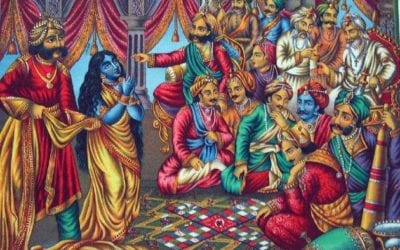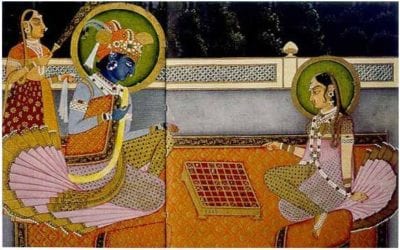On March 26th, at the Boys’ Home, a loud cry was heard. Like a child weeping and wailing unconsolably. All the children stopped short in what they were doing and hurried to the room where the sound was coming from, crowding around the door. When they peered in, they...
WHEN SHAH RUKH KHAN VISITED!
They asked, curious and eager, “Nimma hessaru aenu?” (What is your name? in Kannada) The stranger replied, “Shah Rukh Khan.” Some of the 50 boys present giggled. Others looked a bit confused (should they believe this stranger or not? He definitely did not look like...
THE PROBLEM OF ASHOK
Ashok* was angry and tired. Once again the police had appeared at his home to take him away. This was the third time in the last four years, that he had been summarily carted away. He had to leave his family, his friends and other parts of his life all of a sudden...
WHEN LIFE TOUCHES LIFE – A REFLECTION IN THE 150TH YEAR OF GANDHI
Prof. Cheriyan Alexander Here is a photograph from 1936 that I saw recently and that got me reflecting about the two marvellous lives that get connected here. Here we are in 2019, a special year, the 150th birth anniversary of MK Gandhi, and pictures like this are...
Persistence… for what?
It is over 11 years since Headstreams began. All through, the consistent desire has been to discover/innovate ways to enable participants to live meaningful lives. Facilitating the realization of their inherent potential to do this, has been the thread that runs...
PLAYFULNESS IN OLDER ADULTS
“It is in playing, and only in playing, that the individual child or adult is able to be creative and to use the whole personality, and it is only in being creative that the individual discovers the self.” – D.W.Winnicott Older adults are an important part of the...
NON SOCIAL PLAY IN CHILDHOOD
Kenneth Rubin and his associates in their research work on social and non social play, have tried to distinguish the difference between social and non social play. Rubin, Fein and Vandenberg (1983) defined play in terms of the following characteristics: (1) Play is...
Stages of pretend play
Pretend play is a very important part of the developmental aspect which is very normal as well helps in enhancing the cognitive, emotional, language and social skills. Also through pretend play a child is naturally learning to solve problems, think creatively and...
IMPORTANCE OF PRETEND PLAY
Whenever children say ‘let’s pretend’, a new landscape of possibilities is revealed. When children pretend, they try on new feelings, roles and ideas. They stretch their minds along with their imagination. – Curtis & Carter. I am a doctor...
THEORIES OF PLAY – PART 5
In social play children learn to negotiate with others, how to please others, and how to modulate and overcome the anger that can arise from conflicts – Peter Gray (Free to learn) Kenneth H. Rubin is a Professor of Human Development and Quantitative Methodology and...
THEORIES OF PLAY – PART 4
“In play, children work together to change the rules to meet the situation they face, which is powerful social experience.” – Joan Almon Mildred Bernice Parten Newhall, was an American Sociologist and a researcher at the University of Minnesota...
THEORIES OF PLAY – PART 2
Play is the highest form of research – Albert Einstein The above quote has a very deep meaning and reflects Einstein’s depth of understanding on play as being vital to human development. Earlier the classical theories looked at play from a very...
THEORIES OF PLAY
“Man only plays when he is in the fullest sense of the word a human being, and he is only fully a human being when he plays” ― Friedrich Schiller Play has been looked at from various perspectives. Fun, frolic, past time, and other synonymous words are the terms...
GAMES OF INDIAN ORIGIN – PART 3
MOKSHPATAM The readers must be wondering about the word above, while an old picture of snakes and ladders has been depicted. It is in fact snakes and ladders, but was named as mokshpatam, Parama Padam and Mokshapat by ancient Indians, as the game has...
PLAY THROUGH THE AGES, INDIAN PERSPECTIVE – II
The famous psychologist Jerome Singer had conducted research studies on play along with his colleagues. While reviewing his research studies, I came across a very intriguing question he asks the readers, and the same question I am putting across. Close your eyes...
KRIDAPATRAM
The picture above that’s been displayed looks like a painting, but in reality it is one of the leaves from ‘playing cards’, used by ancient Indians to play the game of cards, also called as ‘kridapatram’. According to the Aphilomath...
PLAY THROUGH THE AGES, INDIAN PERSPECTIVE
Play, a word, that is synonymous with letting the mind run wild, creating a whole new world using imagination. The word play, brings in thoughts and feelings of lots of fun, fun and fun. The study conducted by Meera Oka et al, mentioned in the earlier blog, has...
GAMES OF INDIAN ORIGIN – PART 2
VARIATIONS OF CHESS Review of literature suggests that the games of chess has had many variations and one of them is the very famous game of dice played by Yudishtira and Duryodhana, also know as ‘pagade‘, which has been very well described in the epic...
GAMES OF INDIAN ORIGIN – PART 1
CHESS The game of chess was invented in India and was originally called Ashtapada (sixty-four squares). It’s believed that this game might have originated around 7th-8th century AD. “Ashtapada” in Sanskrit denotes a spider -“a legendary being...
INDUS VALLEY CIVILISATION – TOYS MADE FOR CHILDREN
The history of Indus valley civilisation has been very intriguing so far, and looking at it’s history from play perspective has completely opened up a new world of knowledge. This write up is a continuation of the previous blog, which threw light upon the fact...





